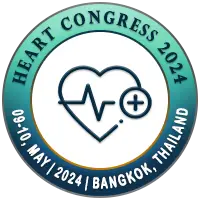
Alina D Nasytko
Rostov State Medical University, Russian FederationTitle: Complication of glucocorticoid therapy of postpericardiotomic syndrome after aortic valve prosthetics
Abstract
The article discusses the clinical case of the development of postpericardial syndrome in a 66-year-old patient after aortic valve replacement. In the postoperative period, there were no prerequisites for the occurrence of exudative pericarditis. In this regard, preventive therapy was not prescribed. After 1 month on an outpatient basis, according to echocardiography, a moderate amount (up to 50 ml) of fluid in the pericardium was revealed. The patient was prescribed colchicine in a daily dose of 1.0 g in combination with ibuprofen 1.8 g. After 1 month from the start of therapy, the effusion remained in the same volume, but with fibrin elements. In order to avoid the formation of constrictive pericarditis, the patient was prescribed prednisone at a dose of 30 mg / day. In dynamics after 1 month pericarditis is not detected. Prednisone has been canceled. However, even short-term administration of it led to a deterioration in the course of chronic heart failure, dilatation of the left ventricle to 180 ml and a decrease in ejection fraction to 44%. This was due to the mineralocorticoid action of prednisolone. Strengthening of therapy aimed at suppressing the activity of the renin-angiotensin-aldosterone system was required. However, the patient has already received the maximum possible dose of bisoprolol, ramipril, eplerenone as is also torasemide. A decision was made to transfer the patient to sakubitril / valsartan at a dose of 100 mg * 2p per day, as a drug that has additional advantages over standard therapy in patients with heart failure after canceling ramipril for 36 hours. After a month of treatment, the indicators of cardiohemodynamics returned to the values before the appointment of prednisone. The final diastolic volume was 160 ml, the ejection fraction was 53%.
Conclusion: Sacubitrile / Valsartan can be recommended in the case of destabilization of chronic heart failure to enhance therapy as a drug with higher efficiency compared with angiotensin-converting enzyme inhibitors.
Biography
Alina D Nasytko is resident in the specialty «Cardiology of the Rostov State Medical University, Rostov-on-Don, Russia. At the moment, she has more than 40 publications, is the winner of many student conferences, was awarded the President's Scholarship, and also works in the cardiac surgery department as a nurse at Rostov Regional Clinical Hospital.

